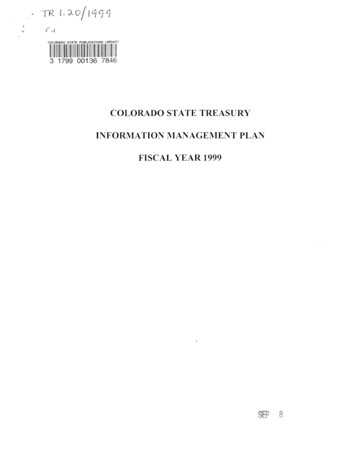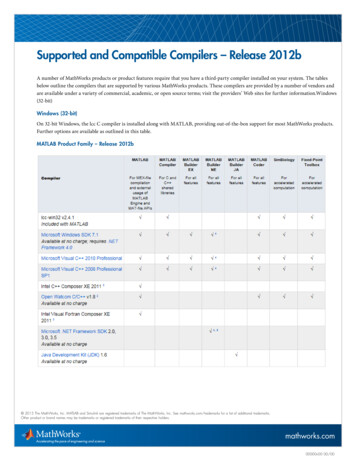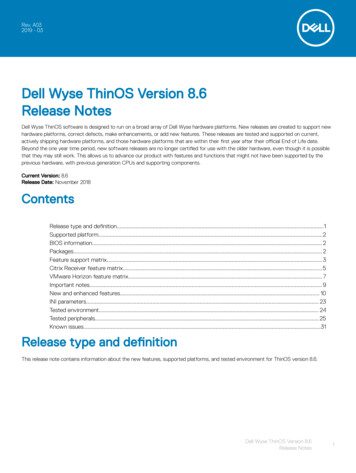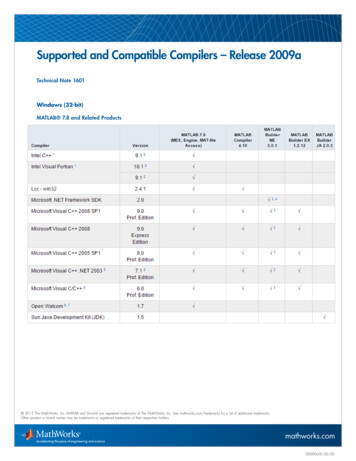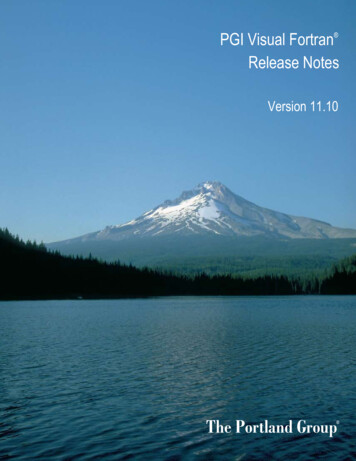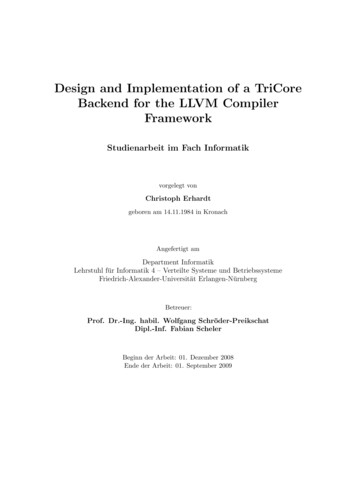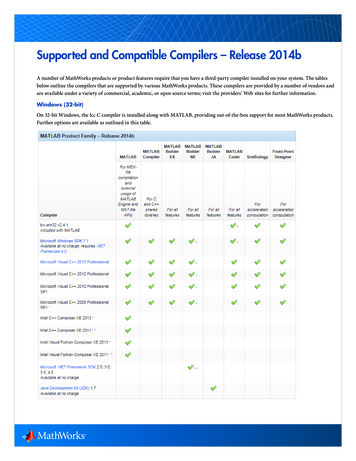
Transcription
Supported and Compatible Compilers – Release 2014bA number of MathWorks products or product features require that you have a third-party compiler installed on your system. The tablesbelow outline the compilers that are supported by various MathWorks products. These compilers are provided by a number of vendors andare available under a variety of commercial, academic, or open source terms; visit the providers’ Web sites for further information.Windows (32-bit)On 32-bit Windows, the lcc C compiler is installed along with MATLAB, providing out-of-the-box support for most MathWorks products.Further options are available as outlined in this table.
Notes for the Windows (32-bit) Platform1.Support for this version of this compiler will be discontinued in a future release, at which time a new version will be supported. Consult theplatform road map for more information.2.Intel compilers depend on tools provided by Microsoft. The following combinations are supported:
3.To build .NET components, a Microsoft .NET Framework must be installed. The .NET Framework v3.0 does not contain a framework-specific compiler; compatible components can be built using the v2.0 compiler. The .NET Framework is automatically installed by Visual Studio.It can also be downloaded from the Microsoft Web site. To execute applications that use the resulting .NET components, the target machinemust have the matching .NET Framework installed.4.MATLAB Builder NE supports building .NET assemblies but not COM objects when using the Microsoft .NET Framework SDK withoutMicrosoft Visual Studio.5.This compiler does not support OpenMP. Code generation will treat parfor-loops as for-loops.6.Fortran compilers are supported with Simulink only for creating Simulink S-Functions using the MATLAB MEX command. TheS-Functions can be used with normal and accelerated simulations.7.sln project generation is not supported when using the Microsoft Windows SDK.8.Simulink Real-Time supports Fortran code in Simulink models using C-MEX wrapper S-Functions.Windows (64-bit)For the 64-bit Windows platform, a C compiler is not supplied with MATLAB. A free download is available that is suitable for most users:Installation InstructionsThe complete set of supported compilers is described below.
Notes for the Windows (64-bit) Platform1.Support for this version of this compiler will be discontinued in a future release, at which time a new version will be supported. Consult theplatform road map for more information.2. Both Microsoft Visual Studio 2008 and Windows Software Development Kit (SDK) 6.1 must be installed. When installing MicrosoftVisual Studio, you must choose “X64 Compilers and Tools” when installing Microsoft Visual Studio; this is not selected by default.3.Intel compilers depend on tools provided by Microsoft. The following combinations are supported:
4.To build .NET components, a Microsoft .NET Framework must be installed. The .NET Framework v3.0 does not contain a framework-specific compiler; compatible components can be built using the v2.0 compiler. The .NET Framework is automatically installed by Visual Studio.It can also be downloaded from the Microsoft Web site. To execute applications that use the resulting .NET components, the target machinemust have the matching .NET Framework installed.5.MATLAB Builder NE supports building .NET assemblies but not COM objects when using the Microsoft .NET Framework SDK withoutMicrosoft Visual Studio.6.This compiler does not support OpenMP. Code generation will treat parfor-loops as for-loops.7.sln project generation is not supported when using the Microsoft Windows SDK.8.Fortran compilers are supported with Simulink only for creating Simulink S-Functions using the MATLAB MEX command. TheS-Functions can be used with normal and accelerated simulations.9.Simulink Real-Time supports Fortran code in Simulink models using C-MEX wrapper S-Functions.Linux (64-bit)On Linux, no C compiler is supplied with MATLAB. The GNU compiler (gcc) is included with many Linux distributions.
To determine the version of your compiler, see Solution 1-1880F.Notes for the Linux Platform1.g libraries are required, even when compiling C-language source code. This may require installing the “gcc-g ” (or similar) package onyour system.2.Fortran compilers are supported with Simulink only for creating Simulink S-functions using the MATLAB MEX command. TheS-functions can be used with normal and accelerated simulations.Mac OS XOn the Mac, no C compiler is supplied with MATLAB. If you use products that require one, Apple’s development environment for OS X(Xcode) is available in the Mac App Store.
To determine the version of Xcode installed, start Xcode and then select Xcode- About Xcode.Notes for the Mac Platform1.This compiler does not support OpenMP. Code generation will treat parfor-loops as for-loops.2.Fortran compilers are supported with Simulink only for creating Simulink S-functions using the MATLAB MEX command. TheS-functions can be used with normal and accelerated simulations. 2015 The MathWorks, Inc. MATLAB and Simulink are registered trademarks of The MathWorks, Inc. See mathworks.com/trademarks for a list of additional trademarks.Other product or brand names may be trademarks or registered trademarks of their respective holders.mathworks.com
8.Simulink Real-Time supports Fortran code in Simulink models using C-MEX wrapper S-Functions. Windows (64-bit) For the 64-bit Windows platform, a C compiler is not supplied with MATLAB. A free download is available that is suitable for most users: Installation Instructions The complete set of supported compilers is described below.

